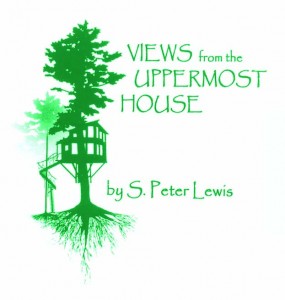Just then my bobber dips

August.
I see that word everywhere these days: in the glance at a calendar, in the writing of a check, in a newspaper headline declaring the waning summer. And if I let it, the mere mention of the eighth month of the year will lift me and carry me back to a distant time and to a remote lake and the mystery of water and the hope that what swims beneath will come my way. In a quick moment, I am no longer a middle-aged man with thinning hair and a family and a mortgage and a car that makes funny noises and two cats who shed. No more do I bear the cares of today on my shoulders or feel the tug of corporate responsibility. Nor am I glued to my desk waiting for the Internet to crash; I’m just a hopeful little boy sitting in a tippy dinghy with a fishing pole and canteen of warm lemonade and an empty bean can packed with moss and full of worms dug from under logs.
The lake is still and quiet and the old sun is slanting low in the west as the shadows of the great pines that line the Adirondack shore stretch out to meet me. With the creeping of evening, my hopes rise as I stare intently at the little red and white bobber that rests motionless in the pewter glare of the surface film. A heron flaps lazily by. A cricket chirps. The tension is almost unbearable. Something is about to happen.
Water is amazing stuff. It expands when it freezes (virtually everything else contracts). It exists in three physical states (solid, liquid, gas — a politician is the only other entity capable of this). Water is called the “universal solvent†because it dissolves more things than anything else, and it has very high surface tension (without that, trees couldn’t so easily pull water up into their leaves). But for one little boy drifting on a remote mountain lake in the twilight of a late August day waiting eagerly for a nibbling bullhead, the most amazing thing about water is its ability to carry sound. It’s all about physics and molecule density and temperature differentials and surface warping and a bunch of other adult-sounding things, but for me, living that long-ago day all over again, it’s pure wonder.
From far down the lake and out of sight around a fir-covered point, an oarlock creaks. A canoe gunwale thumps softly against a length of old fire hose rimming a dock. A kingfisher skims and stipples a backwater, probing for minnows. An axe far away splits a piece of dry maple with a crack. A frog burps, then jumps, then splashes. Somewhere, a child giggles. And each sound, each murmur of late summer life at the lake whispers to me as if its lips were brushing my ear. And still at my bobber I stare.
From our cabin now comes the clatter of supper nearing. Plates thump onto a red and white checkered tablecloth. Forks and knives clink. Pans skid on the stove. Drawers and cabinets open and shut and the oven door slams. Even the unmistakable purling of spring water tumbling over ice in a tall glass glides out to me across the lake. Undistracted and single-minded I remain, staring at my hopeful buoy.
I hear my mom and dad talking now, smooth and low and indistinguishable and nice. Something said, a pause, a reply, and then a laugh. The soft warm sounds of family. And on I stare.
Then comes the most wonderful sound in all of summer — the open creak and slamming rattle of a screen door on the front porch, its spring and hinges strident, straining, shouting in or out with possibility. “Pete, time for supper,†my dad says, his voice sliding out from the shadowed shore, yet also somehow close, as if he were right there with me in the boat. Yet, my eyes are fixed on that bobber.
I’m torn, hungry but vigilant, still staring, still hoping to meet what swims beneath. I smell corn on the cob and roast chicken and my resolve begins to fade. I hear my dad walking in hollow, watery steps out onto the dock, waiting for me. I consider giving up, reeling in, and reaching for the oars. I contemplate giving in to both dad and mashed potatoes and have all but decided.
Just then my bobber dips.

